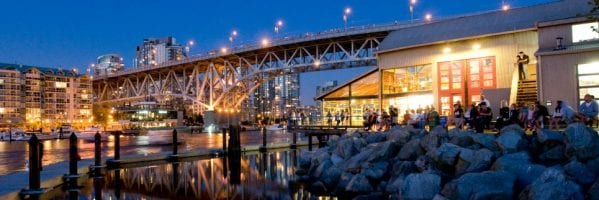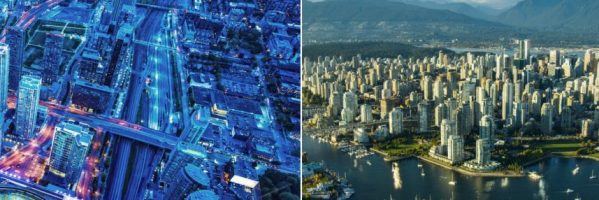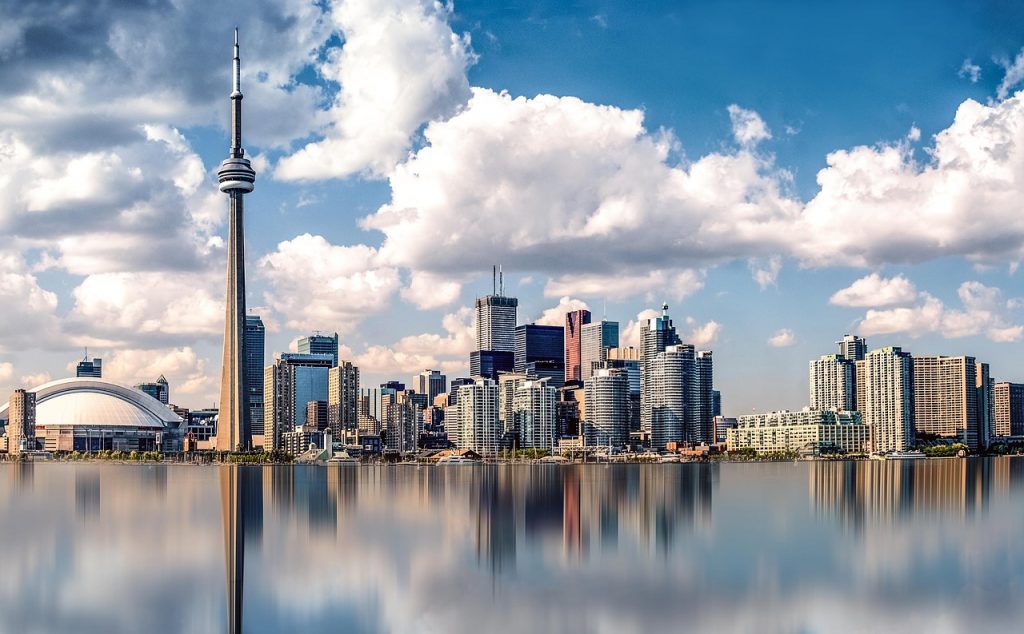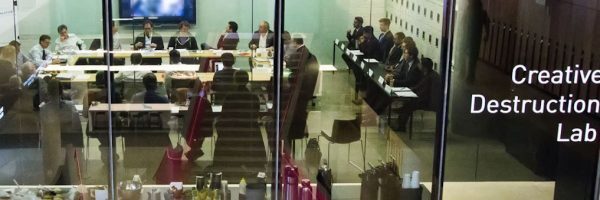Pick Your City: Should You Get an MBA in Seattle or Vancouver?

The U.S. vs. Canada? No, we’re not talking about hockey (this time)—we’re discussing MBA programs. Where should you earn your MBA if you have to choose between Seattle and Vancouver? What are the benefits of each city, how much will each location cost, what can you expect in terms of job opportunities, and what MBA programs are available in each city?
While at a glance, Seattle and Vancouver seem very comparable—offering similar big-city experiences for residents—when you dig a little deeper, the differences are striking.
In our “Pick Your City” series, we break down two similar locations to help you choose your best MBA program. Continue reading…
5 Most Affordable Pacific Northwest MBA Programs

The Pacific Northwest is not only a gorgeous place to live; it is one of the best places to work. Washington state is the fastest-growing state in the country and offers numerous job opportunities in everything from tech to finance and entrepreneurship. So, it should be no surprise that the area is also home to a variety of MBA programs.
Whether you’re looking at MBA programs in Vancouver, Seattle, Portland, or somewhere else entirely, there are many business schools to consider if you want a quality education at an affordable price. In fact, some affordable Pacific Northwest MBA programs can get you in and out with your MBA degree for less than $30,000, and all of our top schools get you a degree in less than $50,000.
Below are our top five most affordable Pacific Northwest MBA programs as well as a little bit about why we like them outside of their low tuition. Continue reading…
Pick Your City: Should You Get an MBA in Toronto or Vancouver?

Should you get an MBA in Toronto or Vancouver? What are the benefits of each city, how much will each location cost, what can you expect in terms of job opportunities, and what MBA programs are available?
At a glance, the two Canadian cities are very comparable, offering similar big-city experiences for residents. However, when you dig a little deeper, some major differences arise. In our “Pick Your City” series, we break down two similar locations to help you choose your best MBA program.
Toronto or Vancouver: Cost of Living
Before we start digging down into the nitty-gritty details comparing Toronto to Vancouver, let’s take a look at the facts. When it comes to how much it costs to live in each city, which city comes out on top? According to Numbeo, it’s actually more affordable to live in Vancouver, if you can believe it.
To maintain the same standard of living in both cities, you would need $6,293 CAD in Vancouver compared to $6,900 CAD in Toronto (assuming you rent in both locations). This breaks down to:
- Consumer prices in Vancouver are 8.72 percent lower
- Rent prices in Vancouver are .18 percent higher
- Restaurant prices in Vancouver are 11.46 percent lower
- Groceries in Vancouver are 13.75 percent cheaper
Overall, if you live in Vancouver, your purchasing power is 13.41 percent higher than in Toronto.
However, a major cost of living difference between each city comes down to where specific residents live. According to data from Expatistan, a furnished apartment in the most expensive part of Vancouver can cost about 11 percent more than living in the most expensive part of Toronto.
Toronto or Vancouver: Culture

Vancouver is consistently named as one of the top five worldwide cities for livability and quality of life, and the Economist Intelligence Unit acknowledged it as the first city ranked among the top-ten of the world’s most well-living cities for five consecutive years.
But what about when you start looking at living in Toronto or Vancouver outside of how much it costs? Lifestyle, activities, and culture can be a significant differentiator for where you want to live and earn your MBA. In many ways the cities are very similar; they offer all the same essential conveniences that you would expect from any big city.
Toronto Lifestyle
Toronto is the largest city in Canada. It’s known for being the financial and cultural hub of the entire country. It has a global city vibe that’s always bustling. Think of it as the New York City of Canada. If you love the city lifestyle, you may love Toronto.
When you are downtown in Toronto, you’ll be surrounded by hundreds and thousands of people all going about their business at the same time. And speaking of business, Toronto’s salaries are the highest in the country, and there are many incredible job opportunities (we’ll talk about this more a little later).
One major selling point for Toronto is its extreme diversity. More than 50 percent of residents belong to a visible minority population group. Residents of Toronto come from all different backgrounds, cultures, and locations. It’s a vibrant community for anyone from anywhere, which can translate to some incredible food, activities, and shops
Vancouver Lifestyle
Vancouver is also a big city, but it’s a lot more laid back. People say the city has a more relaxed pace, which can mean it’s a little boring if you’re looking for nightlife. However, if you’re looking for better work/life balance, Vancouver takes the lead.
However, that also means that business can be a little slower in Vancouver. Don’t expect quite as high salaries or as many open jobs. Though there are still many companies thriving in the area, which we’ll talk about more later.
One of Vancouver’s main features is its landscape. It’s surrounded by mountains, which makes it not only one of the most beautiful cities in Canada but one of the best for outdoor enthusiasts. There are many opportunities for skiing, kayaking, hiking, and more all within 30-minutes of downtown.
We also have to mention Vancouver’s incredible public transportation. It has the world’s longest fully automatic driverless train system in the world: Skytrain. It’s known for its efficiency and regularity. There’s also the Seabus, which ferries people to North Vancouver in 20 minutes.
Toronto or Vancouver: Job Opportunities

Toronto is one of the most multicultural and multiracial cities in the world with established ethnic neighborhoods such as Chinatown, Corso Italia, Little India, Greektown, Koreatown, Little Jamaica, Little Portugal, and Roncesvalles.
When it comes to job opportunities and the economy, Toronto stands out. The city is home to the Toronto Stock Exchange as well as being the headquarters of Canada’s five largest banks (known as the Big Five). Also, many large Canadian and multinational corporations call the city home. You’ll find jobs in almost every industry from technology to design, financial services, life sciences, education, arts, fashion, business services, tourism, and more.
Some of Toronto’s top employers include:
- Accenture
- Bayer
- AIG Insurance Company of Canada
- CIBC
- Ford Motor Company
- Proctor & Gamble
- Oracle
- IMAX Corporation
- Salesforce
- Royal Bank of Canada
- Xerox
As for Vancouver, it’s consistently named one of the top five worldwide cities for livability and quality of life. And since the Port of Metro Vancouver is the third-largest port by tonnage in the Americas (beating out NYC), it offers some uniquely thriving industries, doing more than $172 CAD billion in trade with over 160 different trading economies annually. Vancouver is also a center of software development, biotechnology, aerospace, video game development, animation studios, and television production. There’s also a strong focus on lifestyle and health culture, being the hub for Lululemon, Arc’teryx, Nature’s Path Foods, and more.
Some of Vancouver’s top employers include:
- Best Buy Canada
- BC Assessment
- BC Hydro
- HSBC Bank Canada
- Fraser Health Authority
- Nintendo
- Oppenheimer Group
- SPK Consulting
- Arrow Transportation Systems
Toronto or Vancouver: MBA Programs
Both Vancouver and Toronto are home to some well-known business schools with quality MBA programs. We’ll take a quick look at the top three programs in each location.
Toronto MBA Programs
- University of Toronto Rotman School of Management: Rotman offers both a part-time and full-time MBA program with sixteen possible majors, including Brand Management; Business Design; Sustainability and Health Sector Management.
- Wilfrid Laurier University’s Lazaridis School of Business and Economics: The Lazaridis School offers both a part-time and full-time MBA program along with multiple dual-degree options with specializations in everything from Operations Management to Innovation and Entrepreneurship.
- York University’s Schulich School of Business: The Schulich School offers both a flexible part-time MBA as well as a full-time MBA. Students can specialize in more than twenty different areas, including Arts, Media & Entertainment Management; Organizational Studies; Business & Sustainability and Social Sector Management.
Vancouver MBA Programs
- University of British Columbia Sauder School of Business: The Sauder School offers both a full-time and part-time MBA program with three pre-determined career tracks in Product & Service Management, Innovation & Entrepreneurship, and Finance.
- Simon Fraser University Beedie School of Business: The Beedie School has both a full-time MBA and a part-time MBA. The school stands out for enrolling just 55 students each year and taking only 12 months to graduate.
- Vancouver Island University: The Vancouver Island University offers a 14 to 16-month MBA program featuring 12 core courses in subjects such as Managing and Strategy; Foundations of Marketing; Foundations of Economics; and Basics of Accounting and Quantitative Methods.
The QS World MBA Tour Is Coming To These Select Cities

There are few better opportunities to learn about the exemplary business school opportunities than at an MBA fair. And luckily, for many prospective MBA students, that opportunity will soon be arriving in their city with the QS World MBA Tour.
Inside the University of Toronto’s Creative Destruction Lab

The Creative Destruction Lab (CDL) at the University of Toronto Rotman School of Business is a seed-stage program created exclusively for scalable science-based companies. Launched in 2012, this program employs objectives-based mentoring to help maximize equity value creation for its ventures. The lab is best suited for early-stage companies, particularly those with links to university research labs.
The Creative Destruction Lab Program
The CDL is a nine-month program that employs a coaching process to help business founders commercialize their advances in science and technology. There are four main elements of the program:
- Mentorship: The founders work alongside select entrepreneurs and angel investors in intensive full-day sessions to assess their business progress and to set short-term objectives.
- Investment Opportunities: Founders have the chance to raise capital in meetings with entrepreneurs, angel investors, and partners from leading venture capital firms.
- Technical Feedback: The founders receive advice on their technical road maps and objectives from world-renowned experts at leading academic institutions.
- Business Development Support: Finally, the founders are able to work with MBA students to develop their financial models, evaluate potential markets, and fine-tune their strategies for scaling.
“The breadth and depth of insight that we were given access to was phenomenal,” said participant Karl Martin, founder of Nymi, a wearable technology firm in the healthcare space.
CDL Locations
Unlike many seed-stage programs, CDL has centers in five locations across Canada. Each location focuses on a specific stream of ventures and offers specific resources.
- Calgary: Working with the Haskayne School of Business, the Calgary location focuses on a few key research pillars including energy innovations, human dynamics, engineering solutions for health, new earth-space technologies, and other areas.
- Halifax: The Halifax location leverages the Rowe School of Business at Dalhousie University and fosters “blue-green” technology—focused on agri-tech, bioproducts, and environmental technology—and “prime” technology, including startups tackling problems in healthcare, finance, energy, chemical, media, transportation, and agriculture.
- Montreal: In partnership with HEC Montréal, the Montreal location focuses on startups using artificial intelligence and data analysis technologies.
- Toronto: The main location in Toronto, run alongside the Rotman School of Management, focuses on three types of startups. The first is “Prime” startups tackling problems in healthcare, finance, energy, chemical, media, transportation, and agriculture. Meanwhile, Quantum Machine Learning startups are grounded in physics, math, statistics, machine learning, electrical engineering, and/or quantum computing. Finally, massively scalable Artificial Intelligence/Machine Learning startups focus exclusively on artificial intelligence and machine learning.
- Vancouver: Located in Vancouver, this location operates in partnership with the Sauder School of Business at the University of British Columbia. It focuses on startups in the “Prime” stream as well as those in BioMedTech, including chemical, biological, and medical ventures.
Partnership with NYU Stern to Expand CDL to New York
And, beginning on September 1, 2018, the Creative Destructive Lab will partner with the NYU Stern School of Business to establish its first lab outside of Canada. The newest location will bring Stern faculty and MBA students alongside angel investors, serial entrepreneurs, and founders of pre-seed stage startups in science and technology. CDL New York will begin accepting applications in January 2018 and expects to admit around 25 ventures the first year.
“Our model for developing massively scalable science-based ventures has proved successful in Canada. And we anticipate it will be similarly successful for our partners at NYU,” said Ajay Agrawal, a Rotman entrepreneurship professor and the founder and academic director of the lab, in a recent news release about the expansion.
New Program Executive Director
In other news, Rotman chose Sonia Sennik to be the inaugural executive director of the Creative Destruction Lab and its national network of programs. Sennik will be responsible for the lab’s oversight and coordination as well as its strategic operational and programmatic leadership.
As a recent graduate of Rotman’s Executive MBA program, Sennik is uniquely positioned for her new role. She was the inaugural recipient of the Rotman Social Impact Award and excelled in leadership during her time in the program. She’s also held senior project and engineering management roles at HATCH, a global engineering consultancy.
Of Sennik’s appointment, Agrawal said in a news release: “The Creative Destruction Lab is expanding rapidly, both geographically and programmatically. Sonia will provide leadership, vision, and energy to help ensure the success of the Lab and its ventures in the coming years.”
Graduates of CDL
Over the years, the Creative Destructive Lab has had many graduates, including:
- Thalmic Labs (Waterloo): Thalmic Labs develops revolutionary wearable technologies that explore the future of human-computer interaction.
- Atomwise (San Francisco): Atomwise is a Deep Learning technology designed for novel small molecule discovery to help develop better medicines faster.
- Deep Genomics (Toronto): Deep Genomics creates life-saving genetic therapies including a biologically accurate data- and AI-driven platform that supports geneticists, molecular biologists, and chemists.
- Kyndi (Palo Alto): Kyndi incorporates advanced artificial intelligence and symbolic natural language understanding to help knowledge workers process and consume vast amounts of information in order to better make critical decisions.
- Heuritech (Paris): Heuritech bridges the gap between social media and commerce with cutting-edge deep learning technology that detects emerging product buzzes online.
To learn more about the Creative Destructive Lab, including information about applying, visit the main CDL website.
